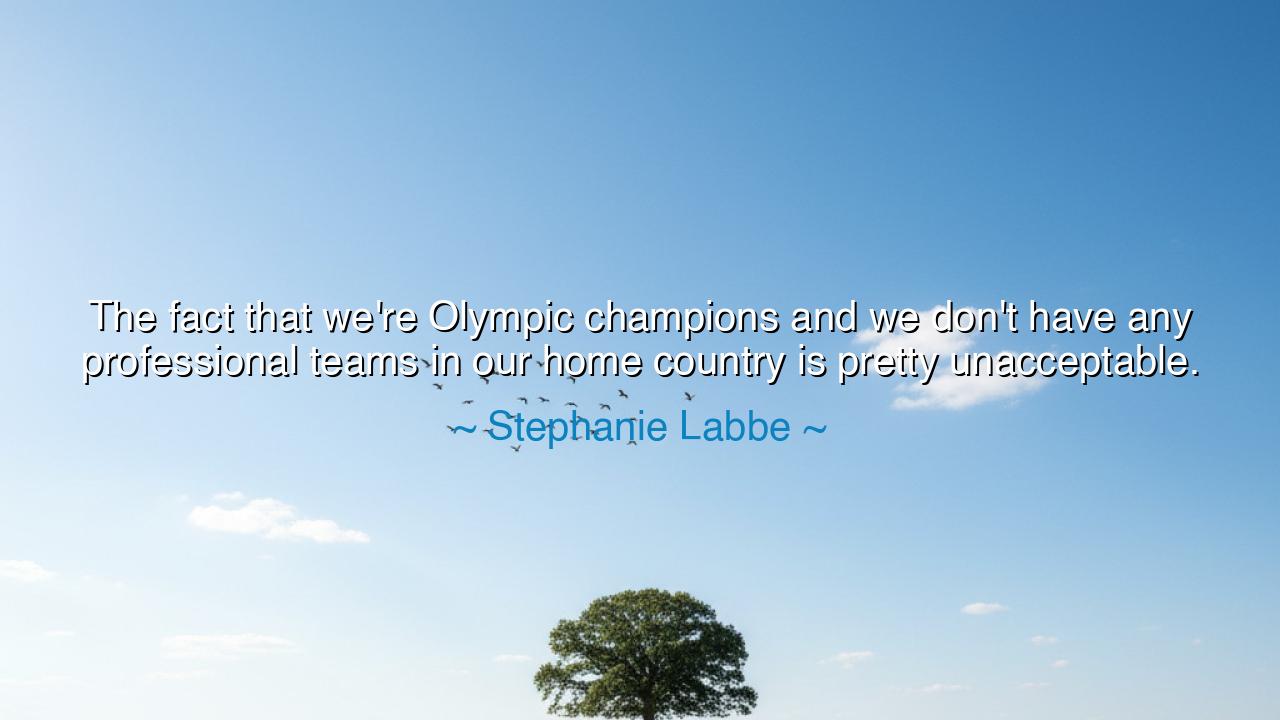
The fact that we're Olympic champions and we don't have any
The fact that we're Olympic champions and we don't have any professional teams in our home country is pretty unacceptable.






In the flaring clarity of Stephanie Labbé’s protest—“The fact that we’re Olympic champions and we don’t have any professional teams in our home country is pretty unacceptable”—we hear more than frustration; we hear a civic summons. The words strike like a bronze gong in a quiet hall, calling sleepers to wakefulness. They measure the distance between glory won on foreign fields and the barren ground at home, where young dreamers search for pathways that do not yet exist. To be Olympic champions and still lack a league is to return from the mountaintop with fire in your hands and find no hearth awaiting it.
The heart of the quote is a simple moral geometry: achievement entails obligation. When a nation receives the laurels of its athletes, it inherits the duty to build ladders for the next climbers. Professional teams are not mere entertainments; they are institutions—workplaces, academies, engines of culture—where excellence is refined and livelihoods are made. Without them, talent scatters like migrating birds, homesick for a sky of their own. The goalkeeper’s verdict—unacceptable—is the old word of prophets who measured a people by how they received their champions and raised their children.
Consider the origin of such a cry. It rises from locker rooms where medals are heavy but futures are uncertain; from airport gates where world-beaters become expatriates to keep competing; from community pitches where girls in borrowed kits ask, “Where do we go next?” Labbé’s sentence strings these scenes into one bright line of argument: a home country that feasts on the feast day must also farm in the off-season. Otherwise victory tastes like borrowed bread.
History nods with a stern smile. In ancient Hellas, the Olympic champions were crowned with olive, but they were also welcomed by cities that remitted taxes, furnished training, and commemorated feats in stone. Excellence was not a traveling miracle; it was a civic craft. When that public craft decays, even the strongest competitors become lone candles in a windy world. The ancients would say: honor without infrastructure is incense without a temple—fragrant, yes, but soon dispersed.
Let a modern tale be set beside it. There was a time when a northern nation sang itself hoarse for its women’s team—parades, headlines, classroom posters—and yet the players returned to leagues abroad to earn their daily bread. The flag waved; the market slept. Only when organizers, athletes, and supporters yoked their strength—petition by petition, meeting by meeting—did the soil begin to turn and the first stakes of a domestic league find earth. The lesson is plain: banners do not build stadiums; people do.
From this saying we harvest a clear teaching: celebrate less with confetti and more with construction. If you love the medal, love the pipeline. Practical actions follow like stepping-stones: (1) Fund youth academies that touch every region; (2) seed professional teams with multi-year commitments, not one-season experiments; (3) guarantee fair wages and medical care so careers are sustainable; (4) weave the women’s game into schools and media until it becomes ordinary to witness greatness at home. Fans, too, have work: buy the tickets, learn the names, bring children to matches and let them see futures wearing their colors.
At last, hear the cadence beneath Labbé’s verdict. Unacceptable is not a door slammed; it is a door rung until someone answers. The keeper’s voice belongs to anyone who has ever won for a flag and then searched for a field under that flag. Let the next generation inherit not only stories of podiums but addresses of places to practice, play, and be paid. For a nation proves it deserves its champions not on the day of the anthem alone, but on all the quieter days when it builds the world those champions need. Only then will the circle close: Olympic champions cheered by a home country whose leagues and lights burn steady long after the parade turns the corner.






AAdministratorAdministrator
Welcome, honored guests. Please leave a comment, we will respond soon